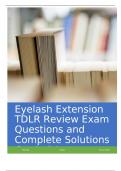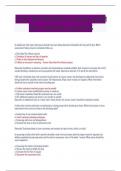Exam (elaborations)
Eyelash Extension TDLR Review Exam Questions and Complete Solutions Graded A+
- Course
- Institution
Infection control - Answer: The methods used to eliminate or reduce the transmission of infectious organisms. (4 types of harmful organisms; bacteria, viruses, fungi, and parasites) Disinfection - Answer: Destroys MOST bacteria, but not bacterial spores; disinfecting tools (disinfectants mus...
[Show more]




